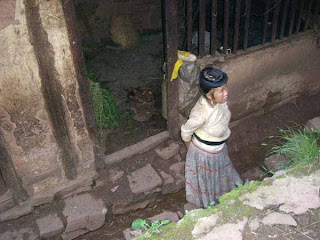Next to Chongqing to join the "Victoria Prince" for a 6 day cruise down the River Yangtze to Shanghai. The ship wasn’t easy to find - they hadn’t warned us that we needed to take a passenger lift to get to the quayside so we stood with our luggage, baffled and frustrated, knowing the ship would soon be sailing but totally unable to see where it was berthed or how to get to it! But once aboard and in our comfortable air-conditioned cabin we were able to relax and enjoy the holiday.
It was wonderful to relax and watch China go by. The ever-smiling crew looked after us wonderfully well, serving us with excellent food as well providing high-quality entertainment in the evenings.

The most interesting and beautiful stretch is the "Three Gorges" where the river winds through narrow gaps in the mountains as it finds its way from west to east. A large dam has just been built here which has formed a reservoir many miles long up the Yangtze and its tributaries. The water level has already gone up 80 metres with another 20 metres to go. So the gorges are much easier for a large ship like ours to navigate but they’ve lost a lot of their previous grandeur. Still pretty impressive though.
It was fascinating to listen to some of the millions of local people whose homes were flooded and who have been rehoused. The older people mourn the loss of their old homes but the younger generation love living in modern homes with electricity, running water, etc. Some of those who have been given new jobs in other parts of China where the customs, culture and language are quite new to them are finding it hardest to adjust.

Judy and the dam
Trips from the ship included going by cable car up the Yellow Mountain (covered in cloud so not much to see!) and a museum with fascinating items from the tomb of Marquis Yi of Zeng (yes!!). The latter is not as vast as the Xi’an terracotta warriors but more varied and just as interesting - Google it and have a look.
The Yangtze was in flood (remember all that rain in Chengdu?) so we were delayed by nearly a day getting through the locks at the three gorges dam - I couldn’t understand why as the locks seemed well able to cope with all that water) - so the ship had only got as far as Nanjing by the time we were due to leave her. The final leg to Shanghai was by bus.
During the voyage we got the exciting news that our newest grandchild had been born. Mike and Kim have their first child. Isla is a beautiful baby (not that we’re biassed!)
















